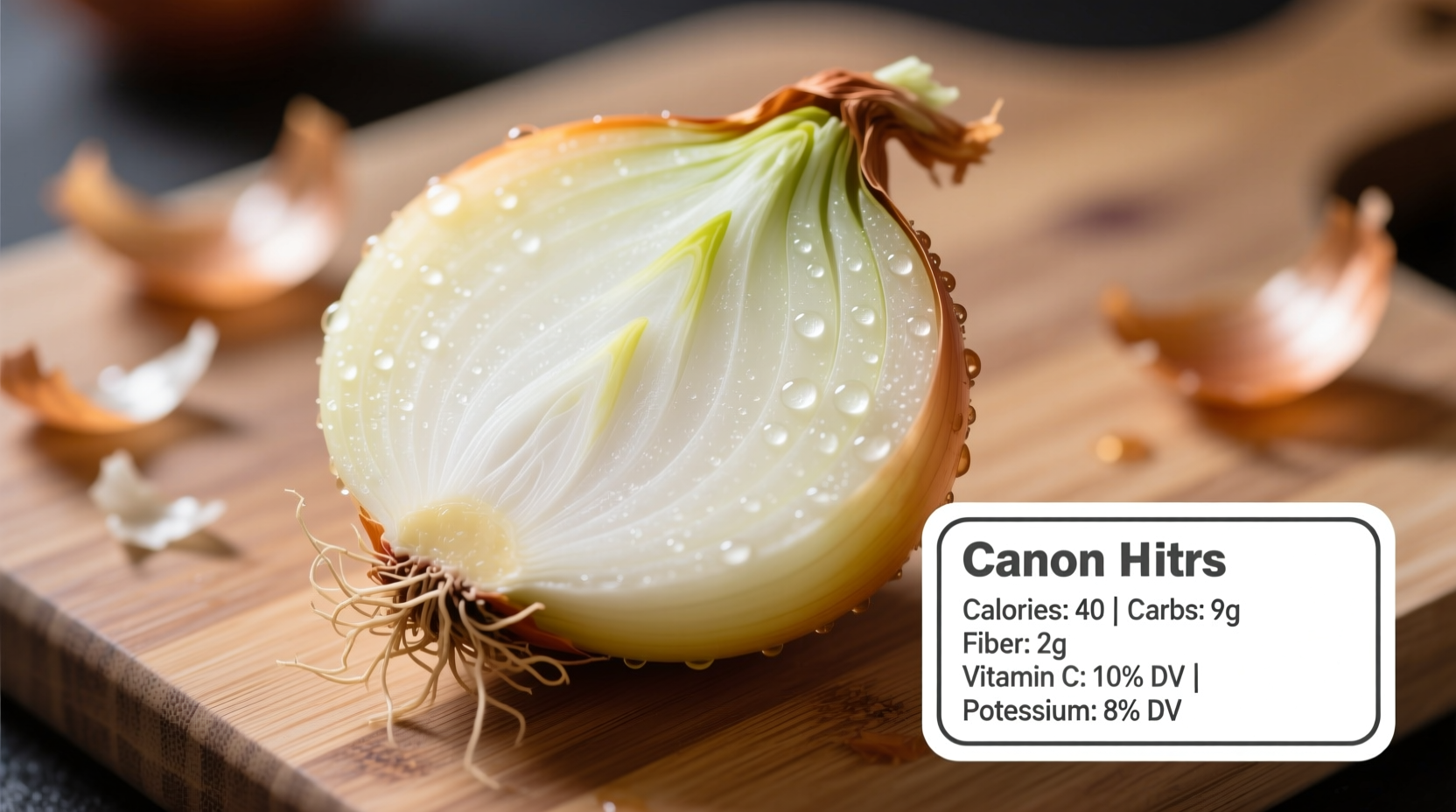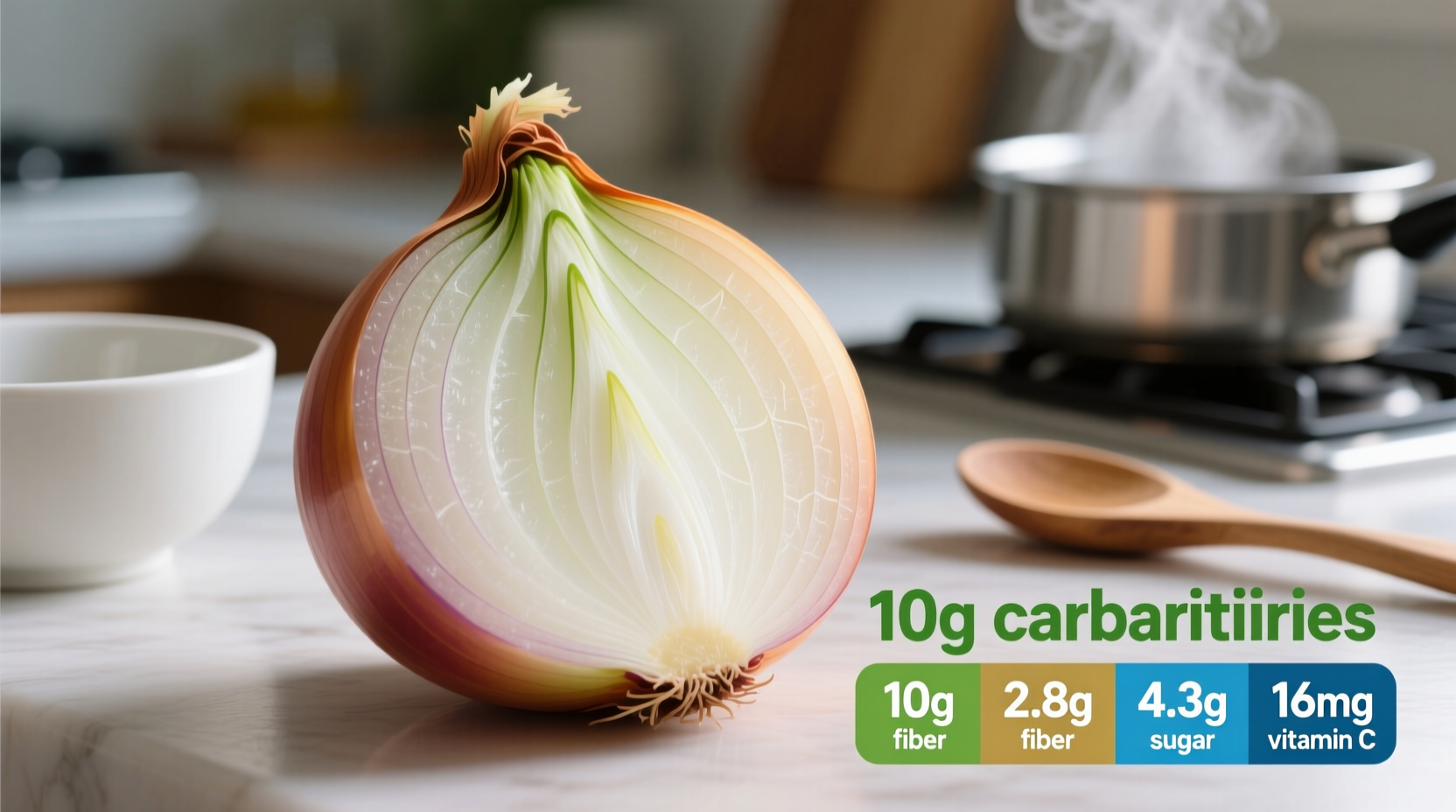Discover exactly how onions can transform your diet with science-backed nutritional insights you can trust. This comprehensive guide delivers precise nutritional data, evidence-based health benefits, and practical usage tips that help you maximize the dietary value of this kitchen staple.
Nutritional Profile: What's Inside an Onion
Understanding the precise nutritional composition of onions helps you make informed dietary choices. According to the USDA FoodData Central database, raw yellow onions (the most commonly consumed variety) contain essential nutrients that contribute significantly to daily nutritional requirements.
| Nutrient | Per 100g Raw Onion | % Daily Value* |
|---|---|---|
| Calories | 40 kcal | 2% |
| Carbohydrates | 9.3g | 3% |
| Dietary Fiber | 1.7g | 6% |
| Vitamin C | 7.4mg | 8% |
| Vitamin B6 | 0.12mg | 7% |
| Folate (B9) | 19μg | 5% |
| Potassium | 146mg | 4% |
| Manganese | 0.13mg | 6% |
*Percent Daily Values based on a 2,000 calorie diet. Source: USDA FoodData Central
Comparing Onion Varieties: Nutritional Differences
Not all onions offer identical nutritional profiles. Research published in the Journal of Agricultural and Food Chemistry reveals significant variations between common varieties:
- Red onions contain up to 2x more antioxidants than yellow varieties, particularly anthocyanins that give them their distinctive color
- White onions have slightly higher water content but lower flavonoid concentrations
- Shallots provide the highest concentration of polyphenols among common onion types
- Green onions (scallions) offer more vitamin K and carotenoids in their green portions
Science-Backed Health Benefits of Onions
The health benefits of onions extend far beyond basic nutrition. Decades of research have documented their therapeutic potential:
Cardiovascular Protection Timeline
Scientific understanding of onions' heart health benefits has evolved significantly:
- 1980s: Early studies identified allicin compounds in onions with potential blood pressure benefits
- 1990s: Research confirmed onions' ability to reduce platelet aggregation, lowering thrombosis risk
- 2000s: Studies demonstrated quercetin's role in reducing LDL cholesterol oxidation
- 2010s: Clinical trials showed regular onion consumption associated with 15-20% lower hypertension risk
- 2020s: Current research focuses on onion-derived compounds for targeted cardiovascular therapies
Anti-Inflammatory and Antioxidant Effects
Onions rank among the top vegetable sources of quercetin, a flavonoid with potent anti-inflammatory properties. According to a 2022 review in Nutrients, consuming onions regularly:
- Reduces markers of inflammation like C-reactive protein
- Supports the body's natural antioxidant defense systems
- May help manage symptoms of osteoarthritis and other inflammatory conditions
- Protects cellular DNA from oxidative damage
Dietary Integration: Practical Usage Guidelines

Maximizing Nutritional Benefits
How you prepare onions significantly impacts their nutritional value:
- Raw consumption: Preserves maximum vitamin C and enzymatic compounds
- Light cooking: Enhances quercetin bioavailability while preserving most nutrients
- Avoid overcooking: Prolonged high-heat cooking destroys heat-sensitive compounds
- Cutting technique matters: Allow cut onions to rest 10 minutes before cooking to maximize beneficial compound formation
Diet-Specific Considerations
Onions fit well into most dietary patterns with some important considerations:
- Keto diets: Use in moderation (½ cup contains ~5g net carbs)
- Low-FODMAP diets: Limit to ¼ cup per serving to avoid digestive discomfort
- Diabetes management: The chromium content may support blood sugar regulation
- Weight management: High water and fiber content promotes satiety with minimal calories
Important Dietary Limitations and Considerations
While onions offer numerous benefits, certain dietary contexts require special attention:
When to Moderate Onion Consumption
Research from the International Foundation for Gastrointestinal Disorders indicates that some individuals may need to limit onion intake:
- Irritable Bowel Syndrome (IBS): Onions contain fructans that can trigger symptoms in sensitive individuals
- Gastroesophageal Reflux Disease (GERD): May exacerbate symptoms in some people
- Blood thinner medications: The vitamin K content could potentially interact with anticoagulants
- Allergic reactions: Rare but documented in sensitive individuals
The National Institutes of Health recommends consulting with a healthcare provider if you have specific medical conditions before making significant dietary changes involving onions.
Practical Dietary Integration Tips
Transform your meals with these evidence-based onion usage strategies:
- Salad booster: Add raw red onions to green salads for maximum antioxidant benefit
- Soup foundation: Use caramelized onions as a flavor base for soups and stews
- Meal prep friendly: Store pre-chopped onions in airtight containers for up to 5 days
- Flavor layering: Combine different onion varieties in the same dish for complex flavor profiles
- Waste reduction: Use onion skins to make nutrient-rich vegetable broth
Conclusion: Onions as a Dietary Powerhouse
Onions represent an exceptional dietary addition with their unique combination of vitamins, minerals, and bioactive compounds. By understanding their precise nutritional profile and implementing evidence-based usage strategies, you can maximize their health benefits while accommodating individual dietary needs. Whether you're managing specific health conditions or simply optimizing your daily nutrition, onions offer versatile, science-supported benefits that deserve a regular place in your diet.











 浙公网安备
33010002000092号
浙公网安备
33010002000092号 浙B2-20120091-4
浙B2-20120091-4